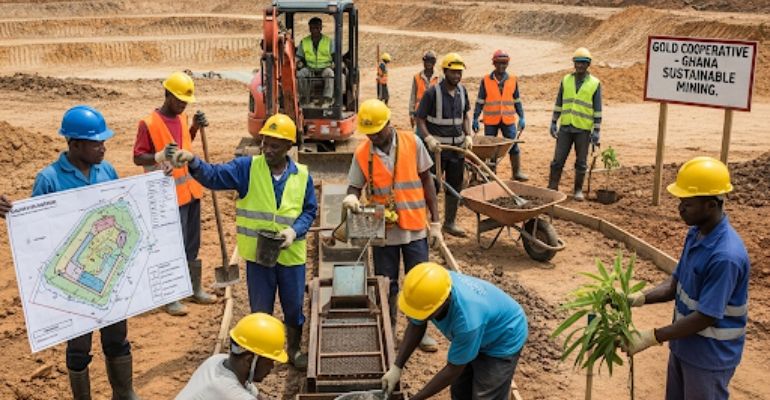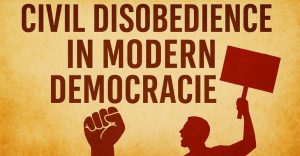
Author: Institute for Liberty and Economic Education (ILEE)
Date: September 3, 2025
Introduction
Illegal small-scale mining, commonly known as “galamsey,” poses a significant and multi-faceted threat to Ghana’s economic, environmental, and social stability. In response, the government has implemented a series of policies aimed at curbing this menace. While many of these policies have relied on a top-down, enforcement-heavy approach, a recent announcement by the CEO of the Environmental Protection Agency (EPA), Professor Nana Ama Klutse, signals a notable shift toward a market-based strategy. The proposed system to formally register and track small-scale miners through associations and cooperatives represents a promising and welcome development that aligns with the free-market principles advocated by the Institute for Liberty and Economic Education (ILEE).
Analysis of the New Policy
The proposed policy, as announced at the ESG and Sustainability Summit in Accra, is centered on the formal registration and organization of small-scale miners into recognized associations and cooperatives. This approach departs from previous strategies that have often relied on the use of force, equipment seizures, and blanket bans, which have proven to be largely ineffective and have led to unintended economic and social consequences.
Instead, this new policy seeks to integrate an informal and often chaotic sector into a formal, regulated framework. By requiring miners to register, the government creates a system of accountability and traceability that was previously non-existent. The formation of cooperatives and associations will not only facilitate easier oversight by regulatory bodies but also empower the miners themselves by providing a collective platform for knowledge sharing, best practice adoption, and access to formal financial services.
Alignment with ILEE’s Principles
The Institute for Liberty and Economic Education (ILEE) has long maintained that sustainable solutions to complex challenges are best achieved through the application of free-market principles. We hold that the use of force and coercion, while often a knee-jerk reaction to societal problems, rarely provides a long-term solution. Our position is grounded in the understanding that when economic actors are given the autonomy to operate within a well-defined and predictable legal framework, they are better able to innovate, create wealth, and self-regulate.
The new government policy directly embodies this philosophy. It recognizes that the individuals engaged in small-scale mining are rational economic actors responding to market incentives. Rather than criminalizing their activities outright, the policy seeks to channel their entrepreneurial energy into a productive and legal framework. This approach is not only more effective but also more just, as it respects the right of individuals to pursue economic opportunities.
Expected Outcomes and Recommendations
ILEE supports this new policy and believes it holds the potential to deliver the following positive outcomes:
- Enhanced Traceability and Accountability: Formal registration will create a database of all legal small-scale miners, allowing regulatory bodies to monitor their operations more effectively and ensure adherence to environmental and safety standards.
- Reduced Environmental Degradation: By working through associations, the EPA can more easily disseminate information on sustainable mining practices, such as land reclamation and responsible chemical use. This collective model can also facilitate shared investment in environmentally friendly technologies.
- Improved Economic Formalization: Bringing small-scale miners into the formal economy will grant them access to credit, insurance, and other financial services, thereby increasing their economic resilience and promoting formal sector growth.
- Increased Revenue Generation: A formalized sector will make it easier for the government to collect taxes and royalties, providing a new source of revenue for national development.
Conclusion
The government’s decision to pivot towards a market-based solution for galamsey is a commendable and strategically sound move. The policy of registering and tracking small-scale miners through associations and cooperatives is a testament to the principle that liberty and well-defined institutions can be the most potent tools for solving even the most intractable of problems. ILEE stands ready to collaborate with the government and other stakeholders to ensure the successful implementation of this policy, which we believe is a significant step toward a more sustainable and prosperous future for Ghana’s mining sector and its people.
References
- “Government moves to register small-scale miners to tackle illegal mining.” Ghana Web, September 1, 2025. www.ghanaweb.com/GhanaHomePage/business/Government-moves-to-register-small-scale-miners-to-tackle-illegal-mining-1998775
- “First African ESG summit: Speakers demand investment in robust data infrastructure.” Graphic Online, September 2, 2025. https://www.graphic.com.gh/news/general-news/ghana-news-first-african-esg-summit-speakers-demand-investment-in-robust-data-infrastructure.html
- “New Cooperative Mining Scheme Introduced to Formalize and Regulate Small-Scale Mining.” Ghana Web, August 25, 2025. https://www.ghanaweb.com/blogs/virginblogger/New-Cooperative-Mining-Scheme-Introduced-to-Formalize-and-Regulate-Small-Scale-Mining-13396
- “Government Launches Responsible Cooperative Mining and Skills Development Programme.” Information Services Department, August 4, 2025. https://isd.gov.gh/government-launches-responsible-cooperative-mining-and-skills-development-programme/
Credit: ILEE Policy Brief Series September 1st – 6th 2025






One Response
Fantastic article by all standard